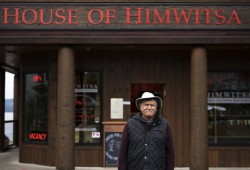A new report highlights both the strengths and ongoing challenges of Tofino's economy, showing signs of improvement in recent years while drawing attention to persistent barriers facing local businesses.
The Tofino Chamber of Commerce released this year's Business Retention and Expansion (BRE) Summary Report on October 23, providing a detailed analysis of the resort town’s current economic climate based on the testimony of 50 business owners across all major sectors.
Data gathered between May 2024 and March 2025 shows a resilient business community committed to growth, yet facing challenges in infrastructure limitations, housing shortages, workforce pressure and governmental concerns.
"This report gives voice to the lived realities of our business community," said Samantha Hackett, executive director of the Tofino Chamber of Commerce, in a press release. "We heard from 50 local businesses, and while their sectors differed, their challenges are interconnected. It's clear that real solutions will require collaboration across government levels, communities, and industries."
Despite the challenges, Tofino's business community shares positive news. The report shows that 44 per cent of businesses plan to expand over the next three to five years, 66 per cent of businesses reported revenue growth, and many see improvements in regional collaboration, policy reform, and relevance for tourism. A business forecast estimates 44 per cent revenue growth over the next three years.
Ahousaht Tyee Ha’wilth Maquinna, Lewis George, who is owner of the House of Himwitsa Native Art Gallery located in Downtown Tofino, says the town’s current economic status is excellent.
"People [are] visiting the west coast from all over the world [and] from Canada within," said George. "We've had a really good season, and we haven't seen the economics like this for a long time."
George comments on how European tourists continue to fill the rooms at his lodge even after the end of September, when tourism presence starts to drop.
However, the report identified multiple obstacles faced by local businesses, posing as barriers to Tofino's economic development.
The infrastructural limitations of highways, local roads, and hospitals continue to be a significant challenge for both habitable and economic sustainability. Particularly in the Highway 4 closure for improvements, as 90 per cent of owners expressed concerns about the lack of transparency, communication, and planning when the road is worked on.
"There's over a million people that come to visit the National Park [and Tofino] every year," said George. "Whenever the road is closed . . . it hurts our bottom line because nobody is shopping. The road is a central means of getting here, because it's the only [way in]."
According to the BRE report, 62 per cent of businesses say the housing crisis is directly affecting their ability to hire and retain staff. Insufficient housing has left 34 per cent of businesses operating under full capacity. Although 48 per cent offer staff accommodation, only 71 per cent own the establishment themselves.
Workplace pressure is another growing issue, linked to the lack of affordable housing, skill shortages and rising burnout levels. About 75 per cent of business owners reported experiencing high levels of burnout. The report revealed that 70 per cent of staff feel overwhelmed and burned out, with 40 per cent working multiple jobs just to afford housing.
"Tofino is a challenging place to attract and retain workers due to the lack of housing," shared one of the interviewed local owners in the RME report. "It's a huge issue now and for the foreseeable future. The quality of housing is also poor, which makes the quality of living a challenge, which diminishes the quality of staff. It's a full-circle problem."
Tofino's government also emerged as a key concern from the locals' perspective. Many business owners cited a lack of trust, inconsistent policy enforcement and urged for a greater transparency and long-term planning from government officials. Nearly 90 per cent of owners reported challenges related to local regulations. In addition, 78 per cent raised concerns about the provincial government's limited investment in tourist destinations and the rising cost of commerce, while 75 per cent pointed to issues with transportation access and infrastructure support.
The report proposes strategic opportunities for addressing every challenge presented, focusing on areas such as water infrastructure, year-round tourism development, regional licensing, and destination housing models inspired by the Whistler and Squamish communities.
To view the full report, please visit: https://static1.squarespace.com/static/55ae982de4b0d41522afbc4b/t/68fa653491d2a120e1be19f5/1761240372088/Tofino+Chamber+2025+BRE+Report+Summary.pdf



